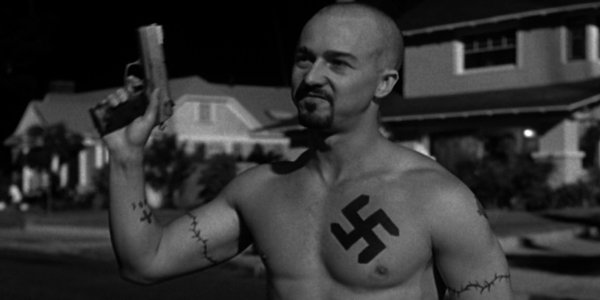American History X Review

rating:4
If you want American History X summarised in one line, here it is: it makes you sympathise with a Nazi and is more hard-hitting than any cinematic piece about race-hatred produced before. Taking place in earlier 90s USA, the film revolves around Neo-Nazi Derek Vinyard (Edward Norton), the psychotic prodigy of a white-power group leader (rather forgettably played by Stacy Keach), and his younger brother Danny Vinyard (Edward Furlong). The story starts with Norton being arrested for manslaughter after killing three minorities trying to steal his car, an act that makes him a hero among his fellow anti-Semitics and causes his younger brother to fall ever deeper into their hate filled world. Chronology is then abandoned as Furlongs character is forced by his school to write an essay (entitled American History X) about what led to his brother going to prison, a last ditched attempt to show the boy the error of his ways. The rest of the film jumps between present day and the events described in the essay, helpfully separated by having all flashbacks shown in black-and-white. Director Tony Kaye uses this technique to great effect, as it both prevents the audience getting confused over the timeline of events and, if one is to look at it on a deeper level, could be said to symbolise how the time prior to the arrest was a much darker time for the family. The quality of acting, particularly on the part of Norton, is almost perfect, resulting in numerous scenes turning from relatively unpleasant to nearly unwatchable, including one of the most realistic and disturbing death sequences in cinematic history. With examples of murder, domestic abuse, extreme racism, humiliation, and rape, American History X really is an emotional punch to the gut and certainly isnt for the faint-hearted, tackling issues a lot of studios wouldnt touch with a seventy-mile barge pole even if they were wearing a Hazmat safety suit. One of the films proudest moments is the portrayal of the older brothers time in prison, as this is the point where the lead Nazi stops just being a hateable monster and becomes much more three-dimensional, adding a previously absent depth to his character. Theres also an underlining tension in this section thats built by the constant threat of violence Norton finds himself under, creating a sense of foreboding anxiety in the viewer that manages to both compel them to keep watching and yet grimace with the sour anticipation of what might be to come. Inevitably there are a few flaws, though nothing that can be said to ruin the overall atmosphere of the piece. Theres a moment later on in the film where Nortons character cries, yet all he actually does is scrunch up his face a bit and make stupid noises, something that, if noticed, rips the viewer from their immersion and propels them back into their living-room like a mood destroying fart. Other than that the problems are pretty minor, like how certain characters seem to be become temporarily psychic or randomly act uncharacteristically before going back to their normal self one line later. These are fairly non-issues though and its unlikely most viewers wont even notice them, so theyre hardly likely to spoil anyones enjoyment of the film. Deep down this isnt just a tale of hatred, but of redemption and brotherly love. Not until This Is England would another piece be made to demonstrate just how unfounded and shallow most prejudices truly are, and the brilliantly crafted American History X will hold a mirror up to any hatreds you may have and show you their misplaced nature. Im not saying watching this film will make you a better person, but if it doesnt influence in you some form of self-reflection or contemplation in how the world works, then theres something seriously wrong. American History X is out now.